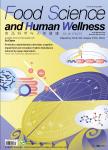Selenium nanoparticles biosynthesized by Eurotium cristatum with antimicrobial activity
作者机构:College of Food Science and Engineering, Northwest A&F University College of Food Science and Technology, Northwest UniversityXi'an College of Bioengineering and Biotechnology, Tianshui Normal University
出 版 物:《Food Science and Human Wellness》 (食品科学与人类健康(英文))
年 卷 期:2024年
核心收录:
学科分类:07[理学] 070205[理学-凝聚态物理] 08[工学] 080501[工学-材料物理与化学] 0805[工学-材料科学与工程(可授工学、理学学位)] 080502[工学-材料学] 0702[理学-物理学]
基 金:supported by the National Natural Science Foundation of China (32172301)
摘 要:Selenium nanoparticles (SeNPs) are increasingly recognized for their exceptional antibacterial properties. This study aimed to develop a green, safe, and efficient method for the biosynthesis of SeNPs using the fungus Eurotium cristatum (E. cristatum), a novel approach in SeNP synthesis. The process yielded (36.4 ± 4.22) mg of SeNPs per 1.2 mmol/L sodium selenite supplementation. These SeNPs exhibited an average diameter of 231.7 nm and a negative charge, and they remained stable when stored at 4℃. UV-vis revealed a maximum absorption peak at 212 nm, suggesting effective nanoparticle formation. FT-IR indicated that proteins and carbohydrates in the mycelium contributed to the SeNP synthesis. Concentrations of SeNPs below 50 μg Se/mL did not exhibit cytotoxic effects on the growth and proliferation of human hepatocyte L-02 cells. The minimum inhibitory concentration of SeNPs was found to be 2 mg/mL against both Methicillin-resistant Staphylococcus aureus (Gram-positive) and Escherichia coli (Gram-negative). The SeNPs compromised the cellular integrity of test strains, causing leakage of intracellular contents and disruption of the oxidative stress system, leading to irreversible damage. Our results demonstrate the potential of SeNPs biosynthesized by E. cristatum to act as effective antibacterial agents, signifying a novel and promising approach to developing natural antimicrobial solutions.



